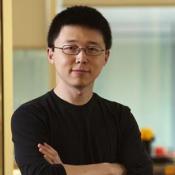Aggregated News

When Feng Zhang was a kid growing up in Iowa, he saw Jurassic Park, like just about everybody else. He was struck by the idea that biology might be programmable, like a computer. Now a core member of the Broad Institute of MIT and Harvard, he pioneered a powerful new gene editing system, CRISPR/cas9, that lets scientists rewrite genetic code.
In the past few years, the use of CRISPR has exploded. On Wednesday, all five of the scientists announced as winners of the 2016 Canada Gairdner International Award—a prestigious $100,000 prize that’s often called a precursor to winning the Nobel—worked on CRISPR's development: the others were Jennifer Doudna, Emmanuelle Charpentier, Philippe Horvath and Rodolphe Barrangou. (Anthony Fauci received the John Dirks Canada Gairdner Global Health Award, and Frank Plummer the Canada Gairdner Wightman Award, both for for HIV research.)
After a breakfast in downtown Toronto toasting Zhang and the others, he and I sat in the emptying ballroom, talking about CRISPR and its future.
“The field is still very young,” said Zhang, a neurobiologist, who’s accustomed...



